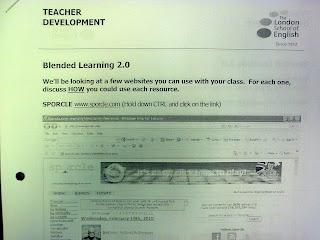 Last week, as part of our weekly social programme, I accompanied a group of students on a visit to a stand-up comedy night in a local pub. Although I have been to lots of comedy shows before, the students had never attended such a night. It was their first experience of live stand-up comedy in London, and one which I am sure was not only fun but also good for their English.
Last week, as part of our weekly social programme, I accompanied a group of students on a visit to a stand-up comedy night in a local pub. Although I have been to lots of comedy shows before, the students had never attended such a night. It was their first experience of live stand-up comedy in London, and one which I am sure was not only fun but also good for their English.First of all, what is stand-up comedy? It is very popular here in the UK as well as in other English speaking countries, but as far as I know it is not so common in other countries. So, if you are not familiar with stand-up, let me briefly outline its features:
It is performed by one person each time: a stand-up comedian who stands up on stage and talks to the audience
The only aim of the performance is to make people laugh
The comedian doesn't use a script (unlike in theatre plays), and they often improvise and ask the audience questions
Sometimes the comedian will pick on members of the audience, but it is just for fun
They share personal stories and experiences with the audience, as well as talking about recent news stories or politics
The night is hosted by a compere or MC who introduces the acts and warms up the crowd
Secondly, what was our comedy night like? Well, at the beginning of the evening we went to a lovely pub which is in walking distance from school and had a drink. There we talked and shared information about our different cultures. I was curious about the role of comedy in the cultures of other countries. I was interested to see what they would think about the performance and whether they would understand everything. The students were also curious about what the comedians would say, and how much of it they would catch. Then we walked to the comedy venue where we ate some food and waited for the performance to start. The show took place in a small room in a pub, where there were rows of seats for the audience, a small stage, a light and a microphone. The students were a little bit nervous because they were worried that the comedians might ask them difficult questions.
During the show, the students laughed and had a good time. I was pleased because they managed to understand quite a lot, although when a comedian from Scotland took the stage, the students didn't understand a word because of his strong accent. He was very funny though, particularly his slapstick routine about London pigeons. One of the comedians did ask the students some questions and I was glad to see that they answered without being too shy. What a confidence booster!
It was great to see the students enjoying some real British entertainment, and it really was a good way to practise their English. In my opinion, if you can understand stand-up comedy, you will be able to understand all the nuances and subtleties of English as a spoken language, and it comes with another reward - laughter.
So, in conclusion, I highly recommend that learners of English experience some stand-up comedy for themselves. Not only is it good for your listening, it is also a great insight into the culture of the English language, and a fantastic way to enjoy yourself while doing it.
If you would like to find out more about stand-up, then you can click here to listen to a conversation I had with a friend recently.
To find out more about stand-up comedy shows in London, click here.





